岡本かの子
1889年、東京市赤坂区(現港区)生まれ、本名カノ。生家は神奈川県高津村在住の大地主だった。1907年、跡見女学校卒業後、与謝野晶子に師事。「明星」「水甕」などに短歌を発表。岡本一平と結婚。40代後半より小説に専念し、1936年発表の「鶴は病みき」が文壇デビュー作となる。1939年脳溢血にて死去。享年49歳。
『家霊』 We both thave to Family traditions
・山の手の高台で電車の交差点になっている十字路の坂道にi入口をはいると「いのち」と書いた暖簾が掛けている有名などじょう店がある。
今から少し以前までまで浪漫的な時代が読いていた。そのとき「いのち」という文字には、何か不安に対する魅力や虚無から出る冒険や黎明に対して、
執拗な追求性が存在していた。
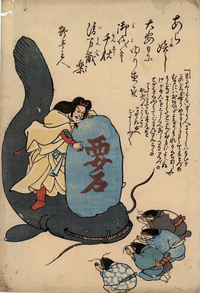
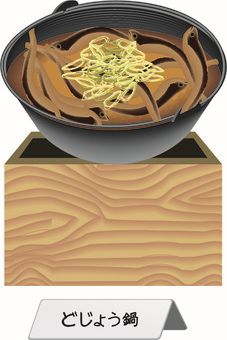
.png)


The shop sells loaches, catfish, soft-shelled
turtles, pufferfish, and in summer, whale.
・On the hilltop in the middle of a crossroads
that serves as a train intersection, there
is a famous restaurant with a shop curtain
that reads "Life"
when you enter the entrance.
I was reading in a romantic era until a
little while ago. At that time, the character "life" had a certain allure to it, an obsessive
pursuit of the adventure
and dawn that arises from concern, and
emptiness.
・「いのち」は母とくめ子と小女が働く、くめ子は母が病気のため母の代わりにこの店で働いているけれども、ここに来店している人生の老ぼう者たちが勢力に対する
食餌療法をするための職業には堪えられなかった。自分は一人娘である以上いずれは平凡な婿を取って、一生この店の女番人にならなければならないだろう。
この店の伝統を忠実に勤めて来た母の姿を眺めると、家職のために無性格にまで晒させれてしまったたよりない様子と、能面のような白さと鼠色の陰影だけの
顔・・・・・・やがて私も母のようになるのかと思とくめ子はブルブル身震いが出た。
きみ子は思った、なんで人はああも衰えというものを極度に惧れるのだろうか。衰えたら衰えたままでいいではないか。人を押しつけがましい匂いをたて、脂がぎろ
ぎろ光って浮く精力なんというものほど下品なものはない。
・くめ子は、女学校を出たのを機会に、家で同様にして、3年間職業婦人の道を辿った。その間蝶々のごとく華やかな職場の上を閃いてとんだり、男のともだちと蟻の
挨拶のように触覚を触れ合わしたりした。母が病気で長い床に就き、親類に呼び戻されて家に帰って来た。くめ子は多少諦めの気持ちであまり嫌がらずに
母の代わりに「いのち」の帳場に就いた。
・In "Life," a mother, Kumeko, and
a little woman work、Kumeko works at the store in place of her mother
because she is ill, but she couldn't stand
the job
of helping the senilr who come here with
dietary therapy for their powers.As Kumeko
is an only child, she will eventually have
to marry an ordinary husband
and become the store's caretaker for the
rest of her life.And when I look at my mother,
who had faithfully worked to maintain the
store's traditions,
it seems that her work had caused her to
lose her sense of personality.And when she
saw her mother's face, white like a Noh mask
and shades of grey,
she began to shiver, wondering if she would
end up like her mother.
Kimiko wondered why people are so terrified of
aging. If you're aging, isn't it better to
just stay aging? There's nothing more vulgar
than energy
that gives off an overbearing smell and
shines with oil.
Kimiko wondered why people are so terrified of
aging. If you're aging, isn't it better to
just stay aging? There's nothing more vulgar
than energy
that gives off an overbearing smell and
shines with oil.
・After graduating from girls' school, Kumeko followed the same path at home and for three
years followed the path of a working woman.
During that time,
she flitted like a butterfly over the glamorous
workplace and brushed antennae with her male
friends like ants greeting each other.
When her mother became ill and was bedridden
for a long time, she was called back home
by her relatives. With a feeling of some
resignation
and little reluctance, Kumeko took up a position at the accounting desk
of "Inochi" in her mother's place.
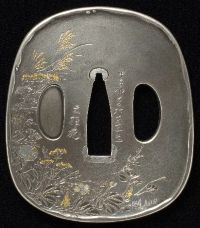
・12月の押し迫った暮れ近き日、「いのち」の前の坂道の砂を払い凍て乾いた土の上に人は下駄の歯が無慈悲に押し付けていく寒い晩。閉店間際に母の馴染み客
彫金師の徳永老人がどじょう汁と飯を注文が入ったが、「いのち」に猪1回、僅かづつの食事代が積り積もって大金になっているから、僅かでも入金してほしいと言う。
ところが徳永は聞く耳を持たず母が帳場にいたころの「いのち」を話し出す。
「とにかく、ひどく寒い。一つ入れて頂きましょうかな」 「喰われる小魚も可哀想になれば、喰う柄私も可哀想だ。誰もかれもいじらしい。ただ、それだけだ。
女房はたいしてほしくない。だがいたいけなものは欲しいときもあの小魚の姿を見ると、どうやらせつない心も止まる」
「娘のあなたにこんなことを言うのはあてつけがましくはあるが」
「以前にも儂が勘定の滞りに気を詰まらせながらお恐々夜遅店を尋ねると、あなたの母は私に対して、『徳永さん、どじょうが欲しかったら、いくらでもあげますよ。
決して心配なさるな。そのかわり、おまえさんが一心に打ち込んでこれぞといった品が出来たらそれを私に売ってください。それでいいのだよと』、繰り返して儂に
言ってくれた」
その時のおかみさんのミイラのような顔から感じたことは、・・・・・・自分がもし過ちでもおこしたら、報いても、報いても取り返しのつかない後悔がこの家から永遠に
課されるだろう、もしまた、世間に誰一人、自分に慰め手がなくなったら自分は灰のように崩れ倒れるだろう・・・・・。
「せめて、生命の息吹を、回春の力を、わしはわしの芸によって、この窓から、だんだん化石化していくおかみさんに差し入れたいと思った。わしは精魂こめておかみ
さんに差し上げるものを作った。」
「……今夜、1夜は、あのこ魚の生命を骨の随に噛みこんで生きのびたい……」
速永が嘆願している様子は、アラブ族が落日に対して拝するように心持顔を天井に向け、駒犬のように蹲り、哀訴の声を呪文のように唱えた。
・On a cold night nearing the end of December,
people brush the sand off the slope in front
of "Life," mercilessly pressing
the teeth of their wooden clogs
onto the frozen, dry earth.Just before
closing time, my mother's regular customer,
an elderly metal engraver named Tokunaga,
placed an order for loach soup and rice,
but the staff asked him to deposit even a
small amount of the meal money, because the
money the staff had lent to
Inochi since my mother's time had accumulated
to a large sum.However, Tokunaga refuses to listen to the
employee's demands
and begins talking about his mother's "life"
when she was working at the accounting office.
"Anyway, it's really cold. I think
I'll have a bowl of loach soup.""When
I feel sorry for the little fish that are
being eaten, I feel sorry for myself for
being eaten.
Everyone is pitiful. That's all. My wife
doesn't really want one. But even when I
want something innocent, when I see that
little fish, my sad heart somehow stops."
"I know it's a bit insulting to say
this to you,"
"Once before, I visited the store
late at night, feeling anxious about not
being able to pay the bill, and your mother
told me over and over again, 'Mr.Tokunaga
if you want loach hotpot, I'll give you
as much as you want. Don't worry. In return,
if you put your heart into it and create
something you're happy with,
sell it to me. That's all right.'"
What I felt at that moment, looking at
the landlady's mummified face, was that if
I made a mistake, no matter how much I repaid
it,
I would be burdened forever with irreparable
regret by this house, and if there was no
one in this world left to comfort me, I would
crumble like ashes...
"I wanted to at least use my art to
inject the breath of life, the power of rejuvenation,
through this window into the landlady who
was gradually turning into a fossil.
I put my heart and soul into creating
this gift for your mother."
"...Tonight, for just one night, I
want to survive with the life of that little
fish inserted into my bones..."
Tokunaga was making his plea, his face
turned towards the ceiling as if he were
an Arab bowing to the setting sun, crouching
like a horse-dog,
and chanting a plea like a spell.
・徳永の話を聞き終わったくめ子は誰もいない料理場に入って明日のために仕込んであったどじょうを掴んだ。くめ子はそのどじょうから生命の呼応を感じた。
くみ子が徳永にどじょう汁を渡すと彼は盗人のようにくぐり戸を抜けて帰った。
・医師に癌だと言われ床に臥せったくみ子の母は、急にご機嫌になった。
「この家の歴代の女将さんたち母も、祖母も亭主は代々放蕩者たちだったが、我慢できれば命を込めたどじょう汁のように慰めてくれることがある
そのことはは母も祖母にもあった」
くみ子の母は死の前に徳永からもらった数多のかんざしを2つ3つ揺すり処女に近い「ほ、ほ、ほ、ほ」と含み笑いをみせた。
・After listening to Tokunaga's story, Kumeko
went into the empty kitchen and grabbed a
loach that had been prepared for the next
day.
Kumeko cried out "awe" to the
loach's life. Kumiko gave Tokunaga some
loach soup, and he slipped out through the
side door like a thief.
Kumiko's mother, who had been bedridden
after the doctor told her she had cancer,
suddenly became in a good mood.
Mother speaks We both thave to Family traditions
"The successive mistresses of this
house, my mother, my grandmother, and my
husband were all dissolute, but if you can
endure it,
they can be comforting, like loach
soup made with life in it.This was true of
both my mother and grandmother."
Before she died, Kumiko's mother shook
two or three of the many engraved hairpins
that Tokunaga had given her and gave me a
virginal laugh,
"Ho, ho, ho, ho."
.jpg)
・それからのくめ子は宿命に従がおうとする勇気と不安、誰かの救いがあることを信じる寂しく敬虔な心持が交差しながら帳場にいた。
A new translatiion of TO LIVE
TO LIVE
To live.
To live this moment.
It is get thirsty.
It is to see the sunlight shining through
the leaves of trees.
It is to remember a certain melody for
second.
It is a sneeze.
It is to hold your hands.
To live.
To live this moment.
It is a mini skirt.
It is a planetarium.
It is Picaso.
It is Tadahiro Marutani.
It is Miyoko Marutani.
It is Yasymasa Marutani.
It is Rumi Marutani.
It is The Mt.Fuji.
It is to meet all the beautiful things.
and
It is to carefully refuse the hidden evil.
To live.
To live this moment.
It is to be able to cry.
It is to be adle to laugh.
It is to be able to get angry.
It is to be able to free.
To live.
To live this moment.
It is the dog barking in the distance now.
It is the earth rotating now.
It is the baby giving the first cry somewhere now.
It is soldier geting hurt somewhere
now.
It is swing moving back and forth now.
It is this moment becoming the past now.
To live.
To live this moment.
It means the birds fly.
It means the ocean makes waves.
It means the sngils crawl on the ground.
It means We love.
It means the warmth of your hands.
It means that we live.
・From then on, Kumeko sat at the accounting
office feeling conflicted between the courage
to submit to her fate, anxiety,
and a lonely, pious feeling of believing
that someone would save her.Although old
man Tokunaga is gradually getting thinner,
he desperately comes begging for loach
soup every night.
January
1939
『紫式部の美的情緒と浄土教』 "Murasaki
Shikibu's Aesthetic Sentiments and Pure Land
Buddhism"
There is no doubt that in her later years,
Murasaki Shikibu's faith in Amida Buddha
became her peace of mind and
she finally turned her attention to Buddhism,
as she herself confesses in the final section
of "The Diary of Murasaki Shikibu."
Having read 「The Tale of Genji」 and the collected waka poems, I have come
to the realization
that the influence of Pure Land Buddhist
thought seems to be quite present in the
works of Shikibu which are included in them,
and I would like to discuss this here.
At that time, miraculous and ritualistic Buddhism
was popular in Buddhism, but there were also
many people
who sincerely sought liberation from the problems
of life and death.
For such people, the Jodo sect, which believed
in salvation in the afterlife, became popular,or,the
Lotus Sutra,
The Pure Land Buddhism of that time was
different from that of Honen and Shinran,
who were later believed in, and was based
on the aesthetic
and emotional Pure Land thought of Sozu
Yokokawa of Mount Hiei.
Of course, it was a pessimistic idea of
??the afterlife, but it had a considerable
positive impact on literature such as "The
Tale of Genji."
The Pure Land philosophy is the ideal of
the best and most beautiful paradise, and
the three Pure Land sutras explain
how the paradise is so beautiful and wonderful.
The seven-fold fence, the seven treasure
ponds, the gold and silver corridor, and
the lotus flower in the earth……Like the
size of a wheel,
the blue color has a blue light, and the
white color has a white light.……The wind
blowing through the net decorated with jewels
and bells produces subtle sounds, and the
sounds of water birds, prayers, and prayer
monks...
Longing is the source of the flow of romanticism.
Is it possible to find any person, thing,
or scenery depicted by Murasaki Shikibu in
her novels that does not reflect at least
a little of
this light of ideal beauty? Pure Land
Buddhism examines reality in its entirety.
Look at the accurate descriptions of human
suffering, such as the five pains and the
five burns, found in the Three Sutras
of the Pure Land Buddhist texts.The more
she felt like the gap between reality and
ideals as this doctrine came into direct
contact with her,
the more she discovered the complex contradictions
in life.The depth of sorrow comes from the
distance between this world and the Pure
Land.
Beauty comes from the ecstasy of idealism.
Face reality from this elevated perspective.
With the ability released from this ordinary
place, he desires the secular world. this
is the ultimate spiritual realism.
It is not in a dream, nor does it exist
in this world. The exquisite clarity of Murasaki
Shikibu's writing is coming from the Promenade
of
the Rainbow Bridge of Time, bridging the
real and the surreal.
I believe that the influence of Pure Land
Buddhist thought on Murasaki Shikibu should
be compared to the medieval theology of Dante,
who so deeply embedded the reality of life
in heaven and hell.
May
1935 (Showa 10)
『現代若き女性気質集』 Collection of the
spirts of modern young women
It is a portrait, a satire, a review, a paradox
of the temperament of modern young women.
There are pros and cons. I'll leave it to
the reader
to decide.
・She couldn't sit still. She wanted to
try something. She wanted to test herself.
She wanted to see what her market value was.
・"Love is so stupid that I can't
do it anymore," she said. "But
I don't want to lose my feelings of love."
・For her, anything that isn't speedy has
no appeal. So when she's bored, she looks
at the cars on the street.
・"Marriage? Yes. Either to a man
who will let me do as I please as possible,
or to a strong man who will make me submit
absolutely."
・What a wonderful job it would be if I
had the time to eat chocolate.
・Even the socks I mend should be worn
without any wrinkles.
・"Calligraphy, flower arrangement,
koto, Japanese dance -- I feel a sense of
modernity in these things and would like
to learn them, but
when the time comes...
・"You shouldn't blush when you get
turned down for anything."
・I hate men who try to please women, but
I also hate pushy men who look down on me.
・There's nothing I like more than something
I've made myself, be it clothes or friends.
・"When I open my wallet and find
that I don't have a penny in it, it's so
funny and makes me laugh. I know it's a big
deal, but maybe it's because I'm young."
...When I buy something.
・"We'd say goodbye and then talk
again. That's not something we do."
・"When you're hungry and the train
is taking forever to get home, it makes you
a little sentimental."
・I can guess what will happen next year,
but I have no idea what will happen after
that. Thinking about it gives me a headache,
so I'll stop.
・I'm so happy that I don't have to do
any laundry and can take a relaxing bath.
・"I woI have no sympathy for flowers
like peonies and cherry blossoms that wither
and fall quickly, but I shed tears for flowers
like the seaweed and zinnia
that hang on even after they have withered.nder
why I can't worry like this. Whenever I have
something to worry about,
I have the habit of putting on a record
and relaxing right away."
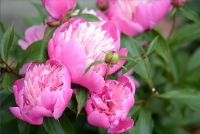
.jpg)

.jpg)
・I only feel the charm of a man when I'm
watching rugby.
・I like kids to be a little clumsy.
・"I'm getting annoyed at how clever
I am, so I'm going to practice being a little
dumber."
・When I have money, I end up taking a
taxi with my friends.
・I can put up with most things, but I
just can't stand insensitive people.
・I'm paralyzed by jazz, paralyzed by movies,
and my interests are generally mundane. I'm
constantly thinking,
"I wonder if there's anything interesting
out there."
・"I want to go to Paris just once
in my life and see it for myself."
・Opening the parasol and eating strawberries
and cream is fun in early summer.
・When I go hiking, I somehow feel like
I'm not satisfied unless I stop by Ginza
after I come back.
・I don't have any desire to become great
or anything like that. It makes me feel empty.
Rather,
I enjoy the feeling of satisfaction I
get from each moment.
・Of course, I do get sulky sometimes.
It's an air pocket when things don't go as
planned because of war or economic circumstances.
However, if you blame it on lack of exercise,
you will find that doing sports regularly
will help.
・When we're outside with our friends,
we make a lot of noise and say things like
"beat him down" and use words that
men use.
However, when she returns home and joins
the family, she becomes a completely different
person, a quiet, well-behaved girl from a
wealthy family.
It's strange, even to me, that I don't
sense any contradiction in either of them.
・"We all want to experience something
that will really make us feel serious at
least once in our lives."
・"I think trends are boring, but
when you try them out, it doesn't feel so
bad.
・"First of all, you have to be cheerful,
otherwise you're wasting your time."
・"If things got tough, I'd be happy
to pose as a nude model and make a living."
・"Even if you ask us to give you
a clear opinion, we can't do that. We want
to gain more experience and then make up
our mind."
・Her laughter is so refined that it seems
completely natural. But she has never known
the taste of genuine laughter.
『女性崇拝』 "Woman Worship"
Westerners are generally seen as respecting
women, but this cannot be generalized.
Apparently, the British are one of the top
ten Europeans who respect women the most.There
is a theory that British respect for women
only applies to those in the drawing room,
and is the exact opposite when they enter
the living room.
Even Bernard Shaw's "Man and Superman"(The
piece was inspired by Mozart's "Don Giovanni."He writes that women
are messengers who,
relying on their charm, can steal sperm from
men and carry out nature's intention to create
the next generation of supermen,
without ever understanding their own subconscious.
It has been said that the development of
clubs in Britain grew out of men's desire
for freedom to escape the constraints of
the housewife's formal feminine dominance
in the home.
On the other hand, there are French people
who do not broadcast their respect for women
so ostentatiously.
It seems that in the home, the husband is
entirely under the housewife's control and
obediently complies.
The French say this is a smart way to live
and live life.
When it comes to the Japanese "Bushido,"
it is often said that women are not even
considered.
When it comes to legal wives, they are given
a certain dignity and are able to assert
sufficient rights.
Toyotomi Hideyoshi, who was infatuated with
his concubine Yodo-dono, showed great respect
for her in his attitude towards his wife,
Kita no Mandokoro.
There are many types of feminists.
Some people respect women because they are
idealistic and have no idea what they are
like,
Some people are humiliated by women because
of their perverted nature.
"When a hero rests his forehead on a
woman's breast, he hears the whispers of
a distant star."
Some people are feminists, who see the mystique
of women as mediums of business inspiration.
This was the case with Napoleon in relation
to Josephine.
In any case, true feminists are qualitative.
From a woman's perspective, a man who is
proud but understanding of women is a better
candidate than a man who has no choice but
to be a weak feminist.
『岡本一平諭』 ー 親の前で祈祷 "Ippei
Okamoto" - Praying in front of parents
"Your husband draws some very interesting
pictures.I'm sure your home is always lively
and fun."
There are times when people say things like
this to me.
"Well, no, not really."
On the surface, I gave a vague answer, butIn
my mind, I felt that he was saying something
completely off the mark.Of course, there
are plenty of interesting
and lively times in my house too.
However, He always says at home, my husband,
Ippei, is usually quiet and gloomy despression.
it comes from his innate nihilistic view
of the world.
Previously, his nihilistic views were manifests
itself in a reckless and dissolute lifestyle.
aa result, he was also quite selfish.
For this reason, he was abandoned by his
parents and countrymen, and his wife rebellion
him of plotting a betrayal of her love.
At that time, his favorite books were mainly
those by Sanba and Ryokuu, but he also seems to have read works by
Doppo and Soseki.
・ShikiteiSanba
・SaitouRiyokuu
・KunikitaDoppo
・NatumeSouseki
He drank more than 1.8 liters of alcohol,
smoked tobacco, and would open three or four
packs of strong rolling cigarettes a day
.He was a man who was completely indulgent
in all kinds of luxury goods.
When it came to food, he preferred the chic,
down-to-earth style, but at the same time,
he was also an outrageous glutton and snacker.
It seems that work progresses better at night
than during the day, and I stayed up all
night almost every night. During the day,
I was mostly asleep or out.
However, even in the midst of such a reckless
and selfish life, he was recognized to have
a lovable goodness and a certain respectable
dignity.
.Since 1970, he has become a full-fledged
religious believer
At first, he was a devout Christian, but
due to the influence of Tolstoy and others,
he did not approach churches or pastors.
Once he believed, he forgot about his own
occupation and simply went deeper and deeper
into that world.
His favorite books changed over time to include
the Bible, writings of Eastern and Western
sages, and religious literature.
At the same time, he gave up his heavy drinking
and smoking, and his life of dissoluteness
and lawlessness was dramatically transformed
into one of prayer
day and night.
His attitude at that time wasMy husband was
just ecstatic with the utmost joy in his
life for the first time since the birth of
his son.
My husband called Jesus Christ by his name
as if he were a close friend or an older
brother.
One day he went to his parents' house,On
one occasion, he surprised his parents by
suddenly kneeling down and praying in front
of them.
He also wore against his skin a small bronze
figure of Christ on a cross, attached to
a bracelet that looked like the kind of old
Roman Catholic monk's necklace
that someone had given him.
His innocent selfishness began to turn painfully
unselfish.
In time, he also had a taste for Mahayana
Buddhism.
Although he did not stray far from Christianity
after that, he seemed better suited to follow
the Buddhist path than Christianity.
His recent Buddhist studies seem very fitting
for him.
Every morning, he wakes up at six o'clock
and before breakfast he sits quietly with
his family and studies th
e Bible and Buddhist scriptures.
He maintains that the ultimate truth of Christianity
and Buddhism is the same.
At present, people seem to be somewhat academic
in their approach to Christianity, and almost
entirely ecstatic about Buddhism.
The idea of ??emptiness has not left him
to this day.However, he gained faith and
began to have hope for "eternal life."
His surface has sunk even further.
Perhaps because he harbors a light deep within
his body, a gentle, calm expression seems
to have spread across his face as he has
aged.
He had given up his habit of overeating,His
health is improving and he weighs nearly
75kg, like an elephant.
He tends to barricade himself in his room.The
room was cluttered with books and half-done
projects, and it seemed like there was barely
any room to step.
In the corner, there is a zazen area with
an incense holder next to a pile of zabuton
cushions.
On the wall, there are about five framed
cartoons by Toba Sojo hanging in a row. .jpg) Toba Sojo
Toba Sojo
When it comes to paintings, while he loves
the canvas itself, he is also keen to learn
the biographies of the artists.
Recently, he has naturally taken an interest
in the calligraphy of Western religious painters
and great Eastern monks.
He preferred the rustic and simple Millet
to the bright and aristocratic Raphael.
Rather than loving the intellectually perfect
Da Vinci, he loves Anzero, whose sorrow and
destruction are simply over.
Among modern artists, he considers the paintings
of Henri Rousseau to be his favorite.
He has always been a very tolerant person
towards others.
It is suspected that this may even tend to
make others feel self-righteous at times.
for example,
outsider"The gift you gave to that person
the other day. The person who received it
said behind his back that such a shabby thing
would never do any good."
Mr."How rude."Instead of saying,"Really?
Well, next time we'll do something that will
please him."
Also, when others insult him,
Kanoko,"Don't you understand how much
you've been treated with such nsult ?"
Mr."I know, but no matter how much they
insult me, my weight in pounds will neither
increase nor decrease."
And it looks fine.
Also, jealousy between men and women is so
intense that it almost makes people think
he is an idiot.
On the one hand, he does not seem to have
much compassion for women, and in the sense
that
he finds love affairs between men and women
extremely bothersome, it could be said that
he has a rather unusual, moderate character.
Although he was a man of great beauty during
his youth, he never had any deep romantic
relationships with women beyond those of
simple carnal desire.
"To enjoy a woman's good parts, you
must lick many of her bad parts."
This is the opinion of Mr. Ikeda that he
does not place much value in women.
He seems to particularly dislike Japanese
geisha and other women with similar tastes,
even among the many women who have become
popular recently.
When it comes to music, he prefers superior
Western music over Japanese music.
I used to go to the comedy hall often because
I liked the performances of artists like
Kosan, but I haven't been there at all lately.
He goes to two or three plays a month, and
among the male actors he seems to like are
Nizaemon and Ganjiro.
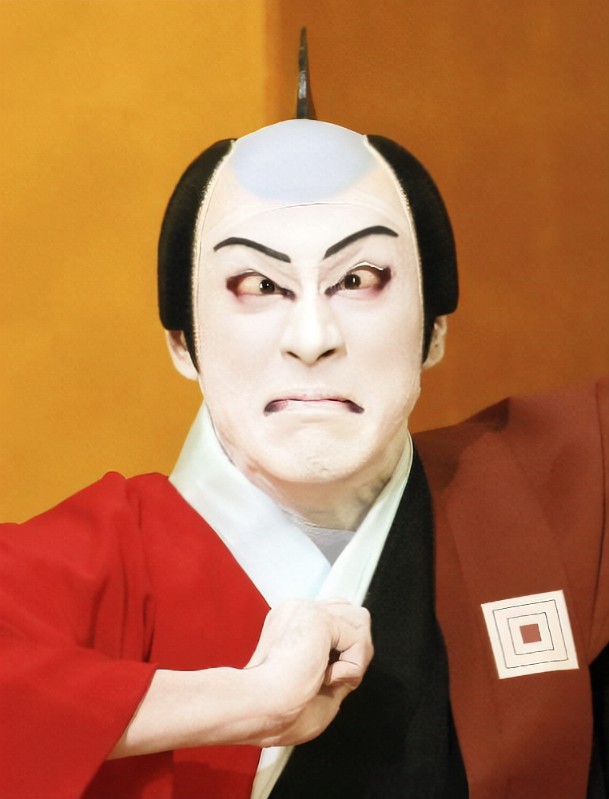
At home, he does not reveal his personal
anger or take out his anger on his family
for personal reasons.
If you happen to give a word of advice to
a family member,
Natsume Soseki said"Not bitter sarcasm."
Also, his family had a visit from a close
friend of his.
When he unleashes his unique style of satire
and humor, the atmosphere in the household
is completely different from usual,
and it becomes very cheerful and amusing.
During these times, he shows a unique flair
of ``wisdom.''
This is by no means an act of vanity or flattery.
His kindness exudes from him a natural nourishment
that allows him to give others a little escape
route and relax in any situation.
He seems to be rather indifferent when it
comes to money as well.
Lately, his appetite has gotten smaller and
he doesn't spend as much as he used to.
He is more interested in insects than flowers
and butterflies.
for example,Lizard,,Frog,etc,
Even as a person,
He does not adopt the cunning of the learned
classes,
He is a man of cunning and resourcefulness,
and when he finds blatant, wild miserliness
and cunning in children and ignorant people,
His interests seem to be active and thriving.
The more evil and violent his breath becomes,
the more he sinks into the ecstasy of love.
He irritates those who commission his paintings.
It seems that the more frequent the urgency,
the more quickly the work can be completed.
Finally, I will share some interesting anecdotes
about him recently.
A thief broke into his house one evening
about two weeks ago.
He watched the fleeing thief from behind,
but just stood there making no attempt to
chase after him.
When the family questioned him,
"After all that adventure, I have gained
my way in, (the thief opened the triple door
with great skill).Let them escape! Let them
escape!”
He was so scared that he couldn't chase the
thieves. Although he has a strong, city-like
appearance, he is actually quite timid and
weak-willed.
The look on his face when he returned home
after his teacher told him off because he
hadn't been able to understand
the koan he was trying to chant in zazen.
(It is like a "question" that
a master (teacher) gives to his disciple.)
I felt so dejected, like a small child about
to burst into tears.
Although there are still some incomplete
parts, I have finally managed to complete
the required amount of paper.
fromFebruary 1921 (Taisho 10) issue"Central
Art"
ご主人さまの作品も紹介します。
We will also introduce our master's work.
坊つちやん「遺蹟めぐり」
.jpg)
(Soseki Natsume is third row from the front,
second from the left)
1
I am currently sitting excitedly on the deck
of a steamship traveling from Tomonotsu in
Bingo to Matsuyama.
This is an enthusiasm to explore the remains
of Natsume Soseki's novel "Botchan."
Was "Botchan" a real person?
To what extent is the concept of this novel
based on fact?
Anyone who has been fascinated by a novel
as a reader,
It is only natural that, as an extension
of my love for the novel and its author,
I would eventually embark on this quest.
I was working on the illustrated story "Botchan"
after I had fully engaged in the drawing.
I left Tokyo as soon as I put down the first
and second parts of "Picture Story."
I have just got off the Sanyo Line and boarded
the ferry.
If Natsume-sensei were alive, he would smile
bitterly.
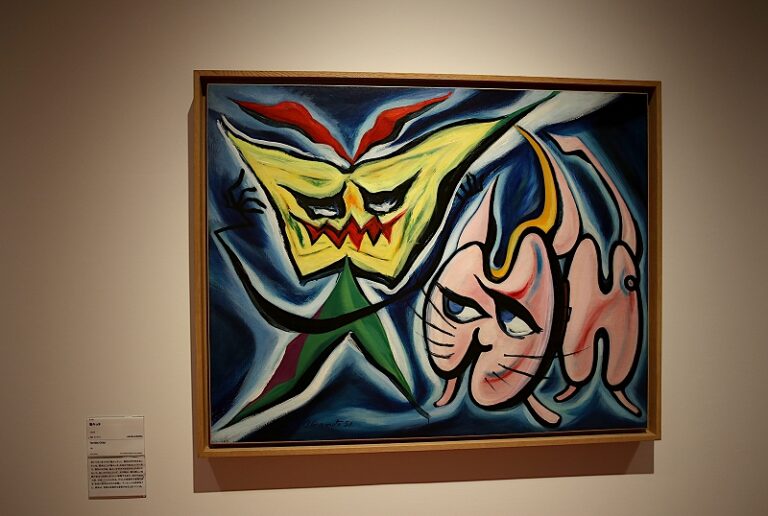
The steam whistle blew again, this time with
a loud blast, and the ship reached the pier.
Takahama, where Botchan arrived,Passengers
were transported by boat, rowed by a boatman.
Today there are two piers where large steamships
can dock, and the chalk Western-style building
is a steamship terminal and is also home
to a row of warehouses.
In the distance you can see Goshima Island,
and the tall one in the center is Goshima
Island's Ko-Fuji.
I was led there by a tout who took me to
the second inn from the corner.
I pulled aside the shoji screens on the second
floor and ate my 75-sen lunch while gazing
out at the sea, which seemed to be permeated
with
the emerald green of Goshima.The voice of
a peddler can be heard in the room.
 Takahama
Takahama
2
Turner Island's real name is Forty Islands
A story about when Botchan was invited by
Red Shirt and Noda to go fishing.
I would like to imagine that the island about
which Noda proposed, in response to Red Shirt's
theory,
"Why don't we name that island Turner
Island?" is Forty Islands.
On the coast of Takahama there is a larger,
wooded island.
There was a hole at the base of the reef
and a pine tree growing out like a hairpin
above a bald, reddish-brown head.
Noda said, "Why don't we put the Madonna
of Ruffalo on that rock?"
In order to see Botchan's reaction, I asked
the inn if we could go fishing in the same
way.
The pleasure boat called Sekai Maru is about
7km away from Yososhima.
We continue on from the boat, letting our
fishing lines drift along the way.
The bait is a small shrimp with its tail
removed and attached to a fishing hook.We
caught a fish
After a while, the three boatmen took up
their fishing lines.
They started arguing in dialect, "you"
and "me."
As soon as I mediated the quarrelThis time,
a group of children in a basin boat came
wading through the waves from the land.
"Sekaimaru, come this far.""Sekaimaruis
round, Sekaimaru is round!"
And they throw stones in our direction.There
was a commotion that we would fight back.
Fishing has stopped.
.jpg) Turner Island's
Turner Island's
3
As Botchan said, the train is a toy-like
steam locomotive.
On the outskirts of Matsuyama, people were
plowing the rice fields with oxen.
What I saw in the rice field was Matsuyama
Castle, which looked like a green bun placed
on top.
The castle is surrounded by a mixture of
forests, roof tiles, white walls, towers,
chimneys, etc.
It's Matsuyama City.
I think this is indeed a place where many
haiku poets come from.
When we got off at Matsuyama Station, there
was a fountain of the goddess in the square.
In the evening, I had dinner with Mr. Matsushita
from the Matsuyama branch of the Osaka Asahi
Shimbun and one other person.
The stylish waitress winks and says, "Welcome."
Oh,I was afraid that if I looked at something
like this I would be knocked down by Botchan
or Yamaarashi,
so I left immediately and went to Dogo where
I stayed overnight.
.jpg)
.jpg)
.jpg)
.jpg)
4
Meet the model for Yamaarashi
The next day, I went to Matsuyama in the
afternoon. I was delighted to go because
Matsushita-kun said he would let me meet
the model for Yamaarashi.
The name of the town was Minatomachi 3-chome
Ura.The nameplate read, in serious handwriting,
"Masatoshi Watanabe."
The old woman led the way into a twelve-tatami
room.
The teacher comes out wearing a cell kimono.
His head was cropped and beardless, and there
were many wrinkles around his eyes, which
looked intelligent yet kind.
When he laughs, his wrinkles tighten like
the opening of a drawstring japanese bag.
When he laughs, he looks a little like a
monkey as he tries to cover his teeth and
gums with his lips.
He can be quite nervous and cautious.
Whenever he responded to a conversation,
he would raise his shoulders, tilt his head
deeply, and carefully think about it, saying,
"Well, that's right, sir."
He had deep smile lines and would slap his
knee with his palm and say "That's right
That's right." He was sensitive and
bone-like.
Speak.
"Yes, the Yamaarashi in that story is
me. I was transferred briefly during my time
at Matsuyama Junior High School,
but since then I have been working there
for a long time. I am a mathematics teacher.
The place where the Red Cross hospital is
now was formerly the junior high school.
Five or six years ago, they built a new building
in what is now Mochida village and moved
there.
Something that comes to mind from what is
written in "Botchan" is,
There was an actual incident where a dispute
occurred between the junior high school and
the teacher when soldiers were
being dropped off at the train station or
picked up.
This probably happened before Natsume Soseki
arrived.He must have written it after hearing
that.
According to people's stories, rather than
fact, my personality is exactly like that
of the Yamaarashi.
When I read it myself, there were parts that
made me think, "I see, that makes sense,"
but the ending was just not good.
If I really were to reach Yamaarashi's state
of mind, I wouldn't do the last thing written
in that book, ha ha."
.jpg)
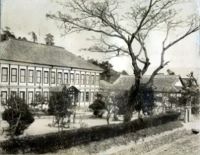 Nibancho era Matsuyama Junior High School
(1894).
Nibancho era Matsuyama Junior High School
(1894).
Matsuyama Middle School and the eucalyptus
tree associated with "Botchan,"
with the Matsuyama Prefectural Office beyond
them
Remains of a junior high school
5
Matsushita led me to the site of the Igagin
House, and as we passed by he showed me the
site of the old junior high school, which
is now the Red Cross Hospital.
This is a public project for the world.
Who on earth is the owner?It's the miser's fault
.png)
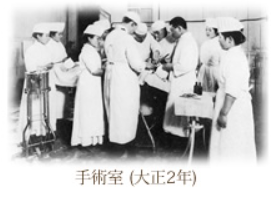
Opened as the 10th Red Cross hospital in
Japan(1913)
.png)
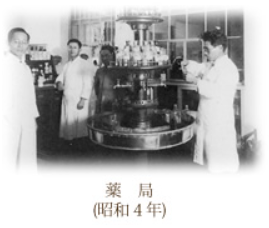
Moved from the east side of Matsuyama Castle
to flat land in March 1919
This is probably where Okamoto-san visited.
.png)
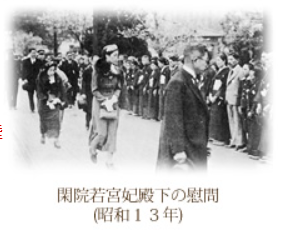
It was used as a military hospital during
World War II.
.png)
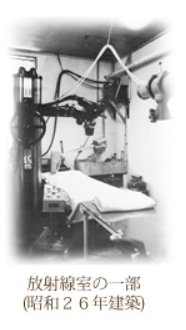
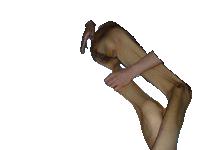
After being bombed by the US military and
burned down, it was moved to its current
location.
Treatment began in a wooden building with
100 beds.(1951)
.png)
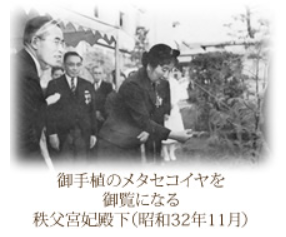
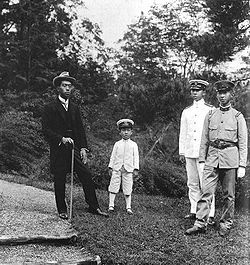 Second from the right
Second from the right
Civilians died violently in the war, but
the royal family was safe.The photo is of
Prince Chichibu's wife.
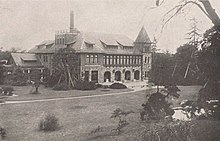 Emperor Hirohito's younger brother Prince
Chichibu lived here.
Emperor Hirohito's younger brother Prince
Chichibu lived here.
In 1940, the Japanese novelist Osamu Dazai
published "Hashire, Meros."
Write the opening part
Melos was furious.
Absolutely, except for that tyrant.Meros
doesn't understand politics.Meros is just
a villager
He was playing with the sheep while playing
the flute、.But he is more enraged by evil
than anyone else.
Melos left the village early this morning.
We arrived in Syracuse, 40 kilometers away.
Meros has neither a father nor a mother.Meros
has neither a father nor a mother.
My younger sister will soon marry a villager.
That's why Meros came to this town to shop.
Meros visited his stilt-walking friend who
lived in this town.
However, things have changed since two years
ago when things were strange.
Meros asked the young man
"Two years ago this town was lively,
but what happened?"
The young man doesn't answerNext, he asked
the old man
The old man said in a small voice
"The king killed a man"
"No one thinks bad of the king, but
they say he has bad intentions."
First he killed his sister's husband, then
his son, then his sister, then her son, the
Empress, and his servant Achilles."
"He said that he couldn't trust people,
and this was also true of his subordinates.Those
who live a lavish life are asked to give
up a hostage.
Six have already been killed by the king."
Melos was furious.
In Japan, it is a textbook designated by
the Board of Education and taught in Japanese
language classes in junior high school.
6
Remains of Iga Gin's House
Mr. Kurita's house has a garden that incorporates
the scenery of Shiroyama.
Mr. Kurita is a retired navy officer who
now works as a company executive and enjoys
collecting postcards.
He graduated from Matsuyama Middle School
in 1892 and taught Mr. Natsume.
The house where Mr. Natsume lived temporarily
was adjacent to the school grounds.
I dropped in to hear this and that.
A gentleman of small size,
He talks about everything in an entertaining
way.
"In front of Mr. Natsume, the vice principal
came and taught the students,The vice principal
was wearing a red shirt.
It is likely that Natsume Soseki wrote The
Red Shirt after hearing this.
The principal has changed several times.
One of the school principals was expelled
by students because it was said he had impregnated
a geisha.
There was a case of a teacher's misconduct
and the principal's wife being a spendthrift
who barely paid for rice.
From then on, this incident became the principal's
fault and he was ostracized.
As soon as a fashionable teacher arrived,
the junior high school students started a
campaign to expel him.
They knocked out Western teachers with snowballs.
Desks were stacked at the entrance to the
classroom.
We did the same thing, but on one occasion
Kawahigashi (Mr. Hekigoto) took up a pen
and brought a letter of impeachment to the
governor.
The students in "Botchan" are just
as rowdy as the students at Matsuyama Junior
High School were in the past.
Just next to the foot of this hill is a house
called Suga.
It house was formerly an antique shop called
Tsuda Yasu.
Mr. Natsume, who had just been appointed
to the post there, rented a detached house
and stayed there for a while.
I remember that whenever I visited, Natsume
Soseki would often come down from the second
floor.
It is said that the idea for silver antiques
and such probably came to the professor from
somewhere around here.
During the time that Natsume-sensei was in
his position, the students often showed respect
for him.
Did you stop by Watanabe Sensei's place?
Oh, Yamaarashi's, is that right?
Although that teacher seemed gentle, he seemed
to have a strict side to him, and the students
were scared of him, but they also grew fond
of him."
I got up and Mr. Kurita took me to see Natsume-sensei's
former hut.
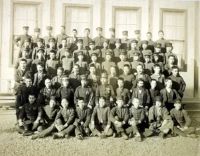
7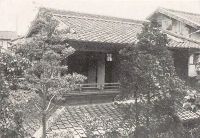
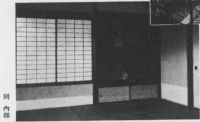
After being kicked out of Ikagin, Botchan
ends up staying with an elderly couple named
Hagino, who he was introduced to by Uranari
Sensei.
The house that says so has a sign with the
pseudonym "Nakai" and is the Geishiiya
house.
On the second floor, where Soseki used to
be, there is a mirror stand,Sarashina is
also in the immediate neighbourhood, where
‘Bochan’ entered this soba shop and the
next day was called ‘Tempura Sensei’ by
his students on the blackboard.
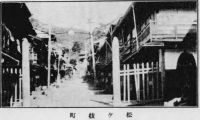
(i) The cedar trees are located on the banks
of the River Ishde.
While I was resting on Matsushita's second
floor, Hyodo from Ehime Shimpo came in.
He wants to take me to my inn in Dogo.
He is associated with a cartoonist who writes
novels based on events that never happened.
I had a feeling from the look in his eyes
that he had an article in mind for tomorrow's
paper.
But then I feel I'm not as famous as I'd
like to be...I like to show how much I appreciate
and thank them.
"Well, thank you very much. Let's hope
for the best."I said
And I felt nausea and sickness with myself.
The streets and eaves of Matsuyama were sprayed
with water.
even in the old castle area
The twilight of a bright Shikoku town is
beautifully dusk.
Through the town there are high prison walls.
On one side is a field. As we go, we enter
the forest bush.
The reflection of the rushing water pierces
the darkness under the trees like a silver
needle and shoots into the eye.
Looks like a tunnel of wet dark green leaves.
This is the riverbank of the River Ishde.
Three men go up the bank.he three figures
are The three of them are so despised that
they are regarded as pointillist figures
in the
Majestic rows of zelkova trees
Guess the cedars where Bo-chan chased and
killed the red-breasted hippo and wildebeest
on their way back from the mountain storm
overnight,
and where the wildebeest are now,
The cedar trees are here,
This is probably the cedar tree where Botsutsuyan
caught Mr. Akashiyatsu and Mr. Noda when
he was tracking them with Mr. Yamarashi.
If I decide to stay here...
Mr Yamaarashi and Mr Bocchan also threw Mr
Akashiyatu and Mr Noda.
Thatched roofs and bamboo thickets, like
sparrowhawk lodges, line both sides of the
shore.
Family members weave bamboo crafts in the
thatched garden.
Then, in the empty space between them, the
householders strung strings on hangers and
manipulated them with their hands.
They make Iyogasuri.
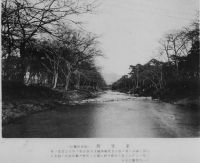
.jpg)
The town of Dogo's hot springs has an oval
shape.(ii) Dogo Hot Springs
In the distance
you can see the hot springs of Dogo.
Surrounded by a beautiful landscape, like
an ink drawing of a distant landscape.
A few cheap western style buildings can be
seen. They do not fit in with the landscape.
The second venue of the Kiyoshinnkai, I hear.
At the entrance to Dogo town, two trains
stop side by side.
This is a race between an electric train
company on the Seiyukai side and a company
on the Kenseikai side.
The town of Dogo's hot springs has an oval
shape.
On the road to the left of the town are spa
inns.the way inns are built is also surprising.
It's like a dragon's palace, with corridors
on the fifth
And sixth floors.And there are a lot of devil
women whoes walk through the city and make
people's hearts flutter.
A couple of aristocratic inns in a row. I
stayed at Funaya Ryokan Villa.When this funa-ya's
flagship restaurant started serving western
cooking,
its most loyal customer was Soseki Natsume.
There is a whorehouse at the end of the town
and a temple nearby.
For eating dumplings at the entrance to the
brothel,
next day, take students to the blackboard
in the classroom.
"Two porridge plates, seven sen, brothel porridge,
tasty, tasty".
This is because they sell their speciality,
roasted rice-balls, outside the gate of the
nearby Ishite-ji temple,
.jpg)
.jpg)
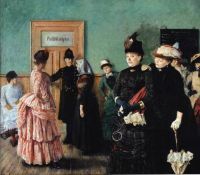
Abe and Tauho joined us while we were eating
at the inn.
I didn't have the heart to say 'thank you
for all your hard work'.
I lay down.
The other guy watched as the foam from the
beer knob was sucked into his lips.
soon, the guests took out hand towels and
soap.
Matsuyama people are used to visiting hot
springs.
Guests' bathtubs became fully stocked,
I was painting the picture you asked me to
do when it began to rain.
Moths and winged insects hit lightbulbs and
fall into carwashes.
.jpg)
.jpg)
(iii) Masuya and Kakuya.
Last night, the guests were having a fool's
night out in the downstairs lounge until
midnight.
This morning I sleep in and take a bath.
Go around the cliff where the shrine is.
Take the exit to the town on the left. There
you will find the bathhouse.
accidentallyI remembered there.
Bochan and his friends had watched a Mr.
Red Shirts playing chicken
.Second- or third-rate innkeepers in Dogo.
In Botschiyan's text.
‘I'm standing here staring under the gas
lamp in the corner house.’
In the text, it r has a post office on one
side.
If not the innkeeper of these streets.The
shop sells
hot spring souvenirs such as Iyo-gasuri dyed
towels, Tobe pottery, bamboo crafts, monkey
slouch, hot spring flowers and candy.Do not
eat in a shop that sells moxibustion or in
any shop that sells moxibustion.
[Ibuki moxa is known as a synonym for superior
moxa.]
.jpg)
(iv) Don't wander off
I bought my ticket at the counter, which
is like the Expo counter.Ordinary is seven
sen, top class up to twenty-six sen.
I bought a regular one.
I opened the gate of the building where I
could see the Goten and entered the building,
which was a bathhouse.
An old woman receiving a hot water card behind
a large folding screen.
On the right, where I can leave my kimonos,
there's a row of shelves.
Through the gate, stone steps lead to the
baths.
On the wet, pale purple stones of the stone's
edge.
The waves of the hot springs are coming into
the area.
Harmoniously inspire travellers.make travelling
familiar and nostalgic.
I felt like I could go to the bath,
I sang Yasugibushi and ran down to the bath.
The old bath keeper propped me up with a
broom.
”Get a shower before you go in.”
And. I see.
Take a shower before entering, but do not
swim," reads a notice on the stone walkway.
It must have been this rule that was the
reason why the 'botsiyan' could not swim.
I had a look at the words 'Ye shall not swim'
and thought about Bochiyan for a while.
The baths are about 15 tatami mats in size,
just as they were when the ‘Bochan’ entered
the baths.
Granite pillars stand in the baths and water
flows from mouths.a pillars are embossed
with statues.
Images of the Kojiki (Records of Ancient
Matters) are engraved on the pillars.
An ancient poem praises the hot springs.
It is engraved in Manyogana.
<Songs of Yamabe no Akahito.〉
・Lords from the capital.
・They boarded at Niigitatsu, it is said.
・That would have been many years ago.
・A lot of things from the past are still
fond memories.
.jpg) 661 AD
661 AD
Empress Saimei on her way to Korea for war,
Kenjirigishitai stayed in Dogo for a little
over two months.
The song that was created at this time was
the song ‘ Nigitatsu no Uta’
・At Nigitatsu
・be out at sea
・If we wait a month...
・The tide is good.
・Now row out
<Nukanoooimi〉
The order in which new hot water flows into
the hot water outlet of the pillar is regulated.
They all have to wait their turn in single
file, with their backs flat against the wings
of the tub on all sides.
This is the state of affairs in the world.
Those who manage to get to the hot springs
will make the most of them without having
to worry about being seen.
The man next to him waits with his mouth
agape, wishing in his heart that the door
would be open sooner.
.jpg)
.jpg) Women's bathroom and Men's bathroom
Women's bathroom and Men's bathroom
(v) of the first class
I bought a superior ticket this time.the
bathhouse gate opens again to allow entry.
The old woman who was in charge of the guard
gave me a strange look.
When I show up at the door with a premium
ticket.
This time the woman politely escorted me
to the third floor.
I thought I was on the second floor, but
there were more steps.
It turns out to be the third floor.
She takes me to a splendid private room.
She folds up my undressed kimono.
I thought she would carry the bathtub up
to the third floor too, but she didn't.
Unfortunately I have to go down to the bottom.
.jpg)
As" Botchan "readers will know.
When a student said it was extravagant for
a teacher to crawl to the first class every
day on 40 yen a month,
the student said he was not allowed to go
to the first class.
When you go out the front from the spa, the
green willow trees lining the town are flowing
in a cool, flirtatious way,
as if they were willows in a spa town.
(vi) Steamers in the Seto .
I'm going to Takahama on a train. It belongs
to the Association of Seiyukai
To get back, we decided to take a steamer
back through the Seto .
Impressions of Botsuchan when he left Takahama.
"The further the boat got away from
the shore, the better I felt about getting
away from the dirty land."
He confesses.
I really feel as if I'm parting with the
remains of the ‘Bochiyan’.
I was not sad to say goodbye to Matsuyama,
that was leaving me on deck.
.jpg)
The evening calm of Seto is famous.
steamer goes through the mirror-like sea.
I can see is lands in front of me, like land.
Kurushima Strait.
It is both beautiful and hard to pass over.
The tidal fall is like a waterfall.
The ship goes in the opposite direction.
On an island covered with pines.
Temples and shrines are hidden away.
In the ship, a man is serving alcohol.
An evening meal was served.
I saw a dish of slime with its eyes peeled
out.
Captain comes to door, removes hat and says
hello.
‘You're all so lousy.’
his head was bare.
The night has gone on.
When I see the lights coming up, that's Tadotsu.
As soon as I get to the landing stage, I
get a call from the seller.
"Anyone got any candy specials ?"
"Buy a bottle of the alcohol of life."
"Selling kamaboko."
I have tasted it.,,,,,,,
A Taste of the Seto Journey.
.jpg)
.JPG)
.jpg)


.png)



.jpg)

.jpg)

.jpg)
.jpg) Toba Sojo
Toba Sojo 
.jpg)

 Takahama
Takahama.jpg) Turner Island's
Turner Island's .jpg)
.jpg)
.jpg)
.jpg)
.jpg)
 Nibancho era Matsuyama Junior High School
(1894).
Nibancho era Matsuyama Junior High School
(1894)..png)

.png)

.png)

.png)


.png)

 Second from the right
Second from the right Emperor Hirohito's younger brother Prince
Chichibu lived here.
Emperor Hirohito's younger brother Prince
Chichibu lived here.




.jpg)
.jpg)
.jpg)

.jpg)
.jpg)
.jpg)
.jpg) 661 AD
661 AD.jpg)
.jpg) Women's bathroom and Men's bathroom
Women's bathroom and Men's bathroom.jpg)
.jpg)
.jpg)
.jpg)